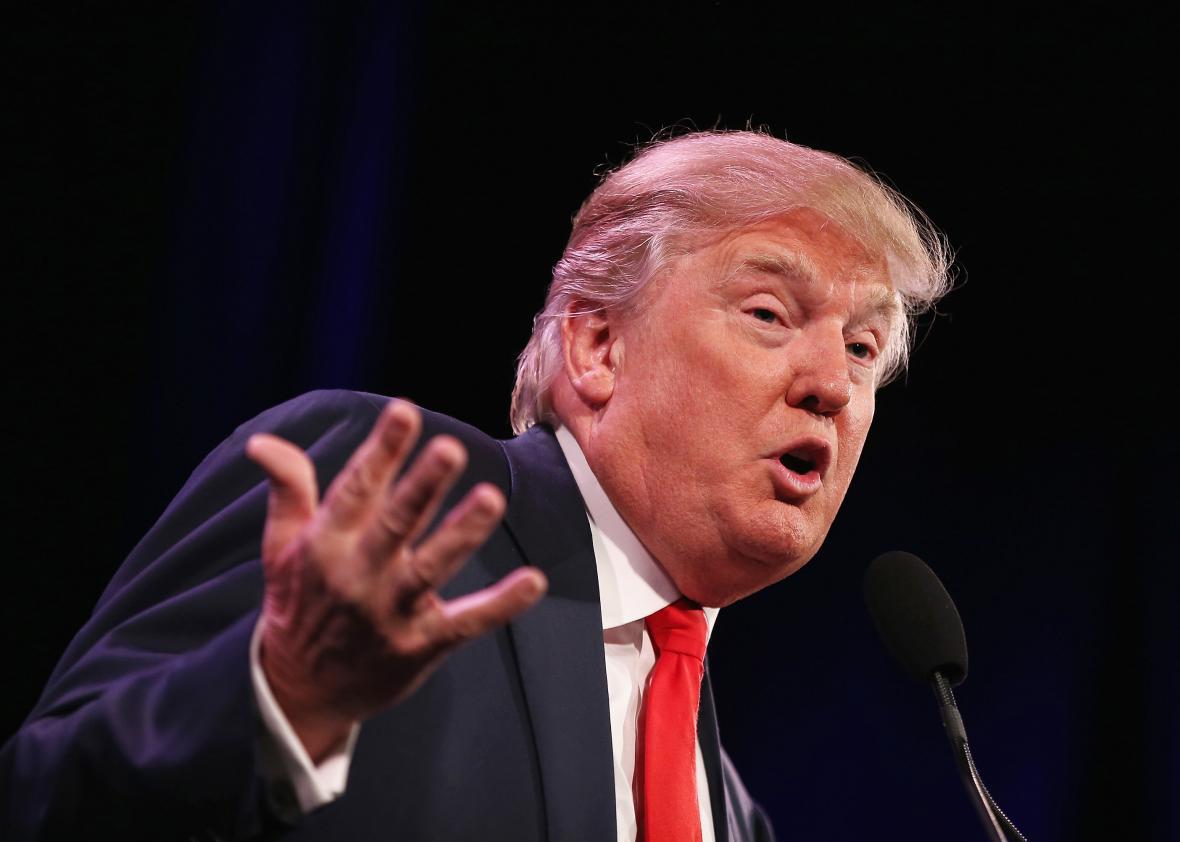Thus far, in the narrative of the 2016 presidential election, Donald Trump is the “unpredictable” one who will scramble the fall election. What this means in practice is that everything Trump says feeds the narrative, even if, after the most cursory examination, it doesn’t fit. And so Monday, for example, we’re told the wily Trump has shifted positions on taxes and the minimum wage, craftily moving toward Hillary Clinton’s left ahead of the general.
But the truth is that this just isn’t clear. Trump made his comments on Sunday on two shows, ABC’s This Week and NBC’s Meet the Press. On the former, Trump said he was “looking” at the minimum wage and that “people have to get more”; on the latter, he disagreed that the federal government should set a floor for the minimum wage and told host Chuck Todd that he would, in a standard bit of conservative code, “rather leave it to the states. Let the states decide.”
On taxes, he told ABC that he would negotiate with Congress and taxes on the rich will “go up a little bit,” asserting that the “wealthy are willing to pay more” and adding that “I have a feeling we may pay some more.” Later, on NBC, he clarified his position, telling Todd that taxes might have to go up relative to his proposal, which slashes tax rates for the highest earners.
Writing for the Washington Post, Greg Sargent correctly (and with some exasperation) notes that these are barely policies or proposals. They’re just vague statements—hand waving in lieu of detail to questions Trump can’t actually answer. “Taken on its own terms,” writes Sargent about Trump’s comments on taxes, “it is a declaration about what the wealthy want to do of their own accord, and merely a ‘feeling’ that something ‘may’ happen in terms of policy to make it so.”
And yet, here we are, examining Trump’s “shift,” marking it as another example of his chameleonlike politics. But there’s a problem. Even if Trump has changed his position on taxes and the minimum wage—and as of Monday, he denies he’s done either—it isn’t really a “pivot” or an “Etch A Sketch” or whatever metaphor is favored by pundits to describe the move to the general election. Insofar as these moves actually matter, it’s because they represent a shift from core commitments, or at least their de-emphasis. In the 2012 Republican primary, Mitt Romney ran as a merciless executor of conservative priorities, but in the general, he remade himself as a moderate champion of the middle class, which forced him to downplay key elements of his policy platform, like large upper-income tax cuts.
For Trump, both tax cuts and the minimum wage are beside the point. They weren’t the focus of his campaign or the reason he won support from a decisive plurality of Republican primary voters. Trump, in fact, has never shown any commitment to conservative spending policies. (It’s why House speaker and leading Republican ideologue Paul Ryan is reluctant to back him for the White House.) If he’s jettisoned them, it’s not because he’s a political shapeshifter so much as it’s because he just doesn’t care.
The real test of Trump’s ability to shift to a general election is whether he can make his core principles palatable to a broad audience, or at least obscure them enough to escape scrutiny. And yes, Trump has core principles.
If there’s one constant in Trump’s rhetoric, from his role in the “birther” movement five years ago to his present campaign, it’s his nativism, his anti-Muslim attitudes, his assorted flavors of bigotry. His opening campaign gambit was mass deportation coupled with a wall along the Mexican border—a position he still holds. Later that fall, he bolstered his intra–Republican Party popularity with a call to ban Muslims from the United States. He boosts racists on social media, is friendly (or at least not hostile) to real-life white supremacists, and has refused to disavow anti-Semitic attacks from his online supporters. Even now, after winning the GOP nomination, he indulges misogyny and misogynistic attacks.
In the 10 months since he launched his campaign for president, Trump has showed the extent to which bigotry sits at the center of his persona. And if he’s going to shapeshift for a general audience, he needs to obscure it. Thus far, there’s no evidence he can. On Thursday, the Republican presidential nominee appeared on Fox News with Bill O’Reilly, where he delivered a message to Vicente Fox, the former Mexican president. “Yeah,” he said, “get your money ready, ’cause you’re going to pay for the wall.” When your campaign is all affect and attitude, what is there to pivot away from but yourself?
Read more Slate coverage of the Republican primary.
